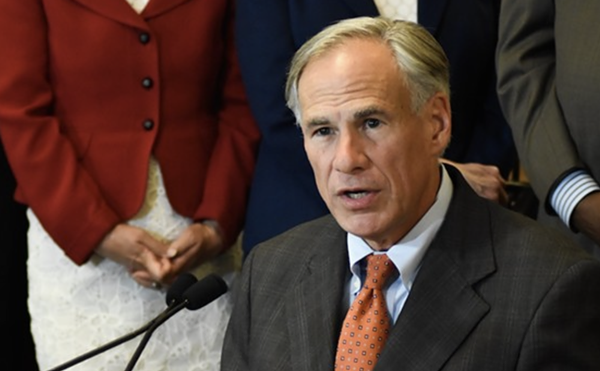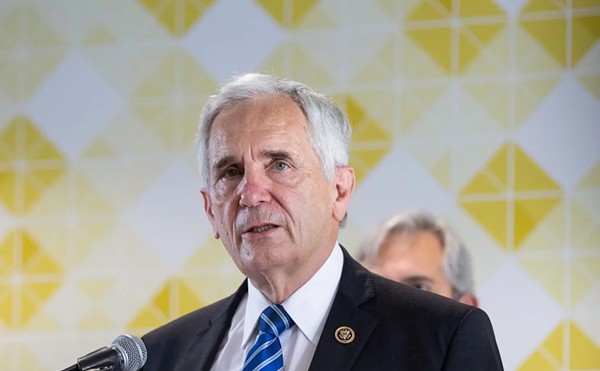| Former Secretary of State Madeleine Albright speaks to a capacity crowd recently at a Barnes & Noble bookstore in San Antonio. Albright was in town to promote her book "Madame Secretary." (Photo by Mark Greenberg) |
Last week, San Antonio became center stage for the national debate about the Bush Administration's decision to invade Iraq. As she signed her new autobiography, Madame Secretary, at a local Barnes & Noble, former Secretary of State Madeleine Albright, who was also ambassador to the United Nations, took issue with the Iraqi war; the day before, David Kay, the Bush Administration's former chief weapons inspector for Iraq, defended the war in a speech at Trinity University.
Albright explained her differences with the Bush Administration's decision in terms of her assessment of the threat posed by Iraq. "This was a war of choice, not of necessity. I didn't understand the 'Why now,' because I didn't see the imminence of the threat," explained Albright. "Now we're going back and looking for Osama Bin Laden in Afghanistan, when we should have just kept our eye on that ball, and not started making up connections between `Saddam Hussein` and Al-Qaeda. That's my problem with all this. It's a question of degree of threat, and whether this was a necessary war. I don't think it was."
Albright argued that the UN weapons inspections had effectively disarmed Iraq in the 1990s. Although she believed that weapons of mass destruction existed in Iraq when she left office in 2001, she didn't think that Iraq had substantial stockpiles, or that Iraq was creating new weapons. "The `UN` inspectors had destroyed more WMD than the whole 1991 Gulf War. The only reason that we thought that there still might be WMD in Iraq was that the `UN` inspectors had a list of what they had to find, and they had not all been accounted for," said Albright. "Bush actually won a diplomatic victory when he got the `UN` inspectors back in, so why didn't he let the inspectors do their job?"
Although David Kay was quoted by Reuters last month that "a combination of UN inspectors and unilateral Iraqi action got rid of `Iraq's WMD`" in the 1990s, Kay told the Trinity University audience a different story: "Throughout the '90s and up to 1998, there was a constant series of crises with Iraq, as Iraqis came forward with some evidence, hid others, and frustrated the inspections. Finally, the inspectors withdrew in 1998 in total frustration of their effort ... And then the inspections essentially ended."
More surprising was that he erased from history what Albright described as Bush's "diplomatic victory." Between November 2002 and March 2003, UN weapons inspectors under Hans Blix searched more than 700 sites in Iraq, and concluded that there was no evidence of WMD in Iraq, nor was Iraq producing them. By not recounting this history, Kay achieved two things: He didn't have to explain why war was necessary when Iraq was cooperating with the UN inspectors, nor did he have to eat crow for admitting the UN inspectors were right in declaring Iraq had no WMD.
In another bizarre statement, Kay repeatedly claimed that not only did the Bush Administration get it wrong about Iraq's WMD, but so did "most of the intelligence communities of the world - British, French, German, Russian."
This claim is nearly impossible to verify without access to these intelligence agencies' classified documents. But the public record tells a different story. The British government is facing a political crisis for its false claims and exaggerations about Iraq's alleged WMD. These included the publishing of a "dossier" on Iraq's alleged weapons, which plagiarized a graduate student's thesis on Iraq's weapons programs pre-1991.
Retired U.S. Air Force Lt. Colonel Karen Kwiatkowski, who worked in the Pentagon's office of Near East and South Asia Policy, recently revealed in a television interview how intelligence was manipulated in what she called a "propaganda campaign" to build the public support for the war: "I joined the office in May 2002, and I became aware shortly thereafter that the decision to invade Iraq and topple Saddam Hussein had already been made by the policymakers. It was simply a matter of pushing the decision forward through the system. That is not quite the same as having a system that informs policymakers with accurate intelligence and measured analysis so that then they can decide what they should do."
Kwiatkowski claimed that a group of neo-conservatives, including Cheney, Rumsfeld, and Wolfowitz, "believed it was right to go into Iraq, and if the American people didn't feel that way, they simply needed to be convinced. Since it was a worthy goal, the ends would justify the means. And the means were to take bits and pieces of intelligence put them together in a way that inspired a great amount of fear, anxiety and a sense of imminence. I saw a lot of propaganda substituting for accurate information and intelligence."
Albright came to a similar conclusion. "There were clearly a group of people around the Pentagon who were bound and determined to go to war with Iraq. They had talked about this plan long in advance, and they had lost the fight in the first Bush Administration." •


















